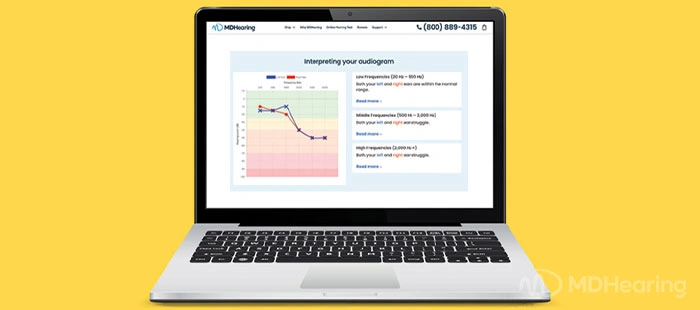From e-commerce to telecommuting, the Internet has revolutionized nearly every aspect of our lives—and healthcare is no exception. It’s now possible to get expert advice on a wide variety of medical issues from the comfort of your own home.
In particular, at-home hearing tests make it easier to evaluate your level of hearing loss and determine whether you would be a good candidate for hearing aids. With more than 28 million people in the United States who could benefit from using hearing aids, at-home hearing tests provide a simple, convenient, and empowering way to take charge of your health. So how do at-home hearing tests work, and how should you get started?
What Are the Signs of Hearing Loss?
Experiencing one or more signs of hearing loss is a good indication that it’s time to take a hearing test. Some of the most common hearing loss signs are:
-
Difficulty understanding speech: People with hearing loss often have problems understanding speech and conversations, especially in noisy environments.
-
Muffled or distorted sounds: Hearing loss often results in muddled or unclear sounds; for example, you may have issues distinguishing between words that sound similar.
-
Turning up the volume: If you frequently need to increase the volume on devices such as TVs and radios, this is a strong indication that you are affected by hearing loss.
-
Ringing in the ear: Tinnitus (a persistent noise in the ear such as ringing or buzzing) is a common symptom of hearing loss.
Why You Should Test Your Hearing
The primary goal of hearing tests is to assess your level of hearing loss. Every case of hearing loss is unique, and understanding your level of hearing loss helps determine the next steps you should take.
Individuals with mild hearing loss, for example, may only struggle to hear soft noises below 30 decibels, such as whispers. Profound hearing loss, on the other hand, makes it hard to hear even the loudest sounds, such as jackhammers and planes taking off. What’s more, the left and right ears may have different levels of hearing loss, which helps provide more context and nuance to any medical care.
Detecting hearing loss early is important for several reasons. For one, it helps you address the matter promptly, seek treatment if necessary, and take steps to prevent further loss. Treatment such as hearing aids can dramatically improve your quality of life and even safety (e.g., by hearing sirens or approaching vehicles). Even if you aren’t currently experiencing hearing loss, regular hearing tests provide a baseline that can be used to monitor any further changes over time.
While estimates vary on how often you should have a hearing test, it’s a good idea for healthy adults to get their hearing checked every three to five years. If you’re over 50 years old, annual hearing tests will help guard against age-related hearing loss and detect any problems early.
At-Home Hearing Tests vs. Hearing Clinics
Traditionally, people with hearing loss have only been able to receive a hearing test at a designated hearing clinic. This is a specialized healthcare facility that focuses on diagnosing and providing treatment for hearing-related conditions.
The most common form of a hearing clinic hearing test is known as audiometry, which evaluates a person’s ability to hear different sound frequencies. This is usually done through pure-tone audiometry, which involves playing a sequence of tones at multiple frequencies and intensities. Patients wear headphones and indicate when they can hear a tone by pressing a button or raising their hands. Speech audiometry is another form of audiometry that uses human speech instead of tones.
Depending on the hearing clinic, other tests may also be available to assess various auditory conditions. For example, tympanometry is an evaluation that detects problems with the middle ear by measuring the motion of the eardrum.
The wider variety of hearing tests available is perhaps the greatest benefit of an in-person hearing clinic. However, finding a nearby audiologist or hearing clinic that matches your schedule and accepts your health insurance is not always a simple task. For this reason, many people prefer to use at-home hearing tests that can be taken 24/7 from the comfort of their own home. Furthermore, at-home hearing tests are gaining more and more popularity with the FDA approval of OTC hearing aids.
What are the Types of At-Home Hearing Tests?
At-home hearing tests come in several forms, including:
-
Online hearing tests conducted through a website.
-
Phone-based hearing tests conducted via a telephone call (landline or cell phone).
-
Mobile app hearing tests conducted via a smartphone mobile app.
Taking these tests requires users to have a device that can support them, as well as a stable Internet or phone connection.
How Do At-Home Hearing Tests Work?
Regardless of whether you take them online, over the phone, or via a mobile app, most at-home hearing tests function similarly. Individuals are presented with a series of audio stimuli, such as tones or spoken words. They then need to respond to these stimuli (e.g., by clicking a button or by typing in the word that was spoken).
The length of an at-home hearing test can vary, depending on how detailed the results will be. They usually range from 5 to 15 minutes. Once the test is complete, individuals receive their results quickly (e.g., via email or displayed on the screen). These results indicate whether the user has any hearing loss, and whether further evaluation or treatment is recommended.
Are At-Home Hearing Tests Accurate?
At-home hearing tests can provide a surprisingly accurate indication of potential hearing issues and can help you determine your next steps. People with mild and moderate hearing loss will likely be able to seek treatment such as hearing aids. However, those with severe and profound hearing loss will need to speak with a hearing professional or audiologist for further testing.
There are a few concerns to watch out for when considering an at-home hearing test:
-
Test quality: At-home hearing tests should be designed by qualified medical professionals. It’s crucial to select a reputable hearing test provider, so look for organizations with the right expertise.
-
Test environment: Hearing tests in a hearing clinic take place in a controlled environment, ensuring that conditions remain consistent throughout the test. At-home hearing tests may suffer from background noise or headphone issues. Be sure to take an at-home hearing test in a quiet environment for the most accurate results.
While at-home hearing tests can’t fully replace hearing clinics, they are an effective way for many people to evaluate their level of hearing loss. If you have questions about your hearing test, it’s best to speak with an audiologist or hearing professional who can help interpret the results and suggest further action. Fortunately, at-home hearing tests often provide the option to speak with a licensed professional via a telehealth appointment.
MDHearing’s At-Home Hearing Tests
We’ve discussed the topic of at-home hearing tests—so which one is best for you? MDHearing offers two at-home hearing tests, completely free of charge:
-
Online hearing test: Designed by professional audio engineers, our online hearing test offers personalized information on your hearing in about 8 minutes. All you need is a pair of headphones and a computer, tablet, or smartphone with Internet access. This is a pure-tone hearing test, which tests how well you can hear a series of tones at different frequencies. You will identify the softest level you can hear by adjusting the volume of these tones based on your hearing. When the test is complete, you will see your results immediately along with an explanation of those results. This information will also be emailed to you.
-
Phone-based hearing test: Our phone hearing screening takes less than 5 minutes and works with both landline and mobile phones. It tests how well you understand speech by playing three numbers spoken at different levels of background noise. After completing the test by entering the numbers on your phone keypad, you will be able to hear your results immediately and can also receive them via text message. Our phone screening test is based on the Indiana University research study “Telephone screening tests for functionally impaired hearing: current use in seven countries and development of a US version.”
MDHearing’s Free Virtual Consultation
Once you’ve completed one of MDHearing’s at-home hearing tests, you have the option to schedule a free, one-on-one consultation with one of our licensed hearing professionals.
During your consultation, our hearing care professionals will analyze and explain your hearing test results. They’ll also discuss your lifestyle, current hearing needs, and any difficulties you may be experiencing. They’ll be able to answer your questions and recommend whether a hearing aid is right for you. If it is, they will be happy to guide you through your options from our affordable line of hearing aids.
Check your hearing now with MDHearing’s online hearing test and get your results instantly.
TAKE ONLINE HEARING TEST


